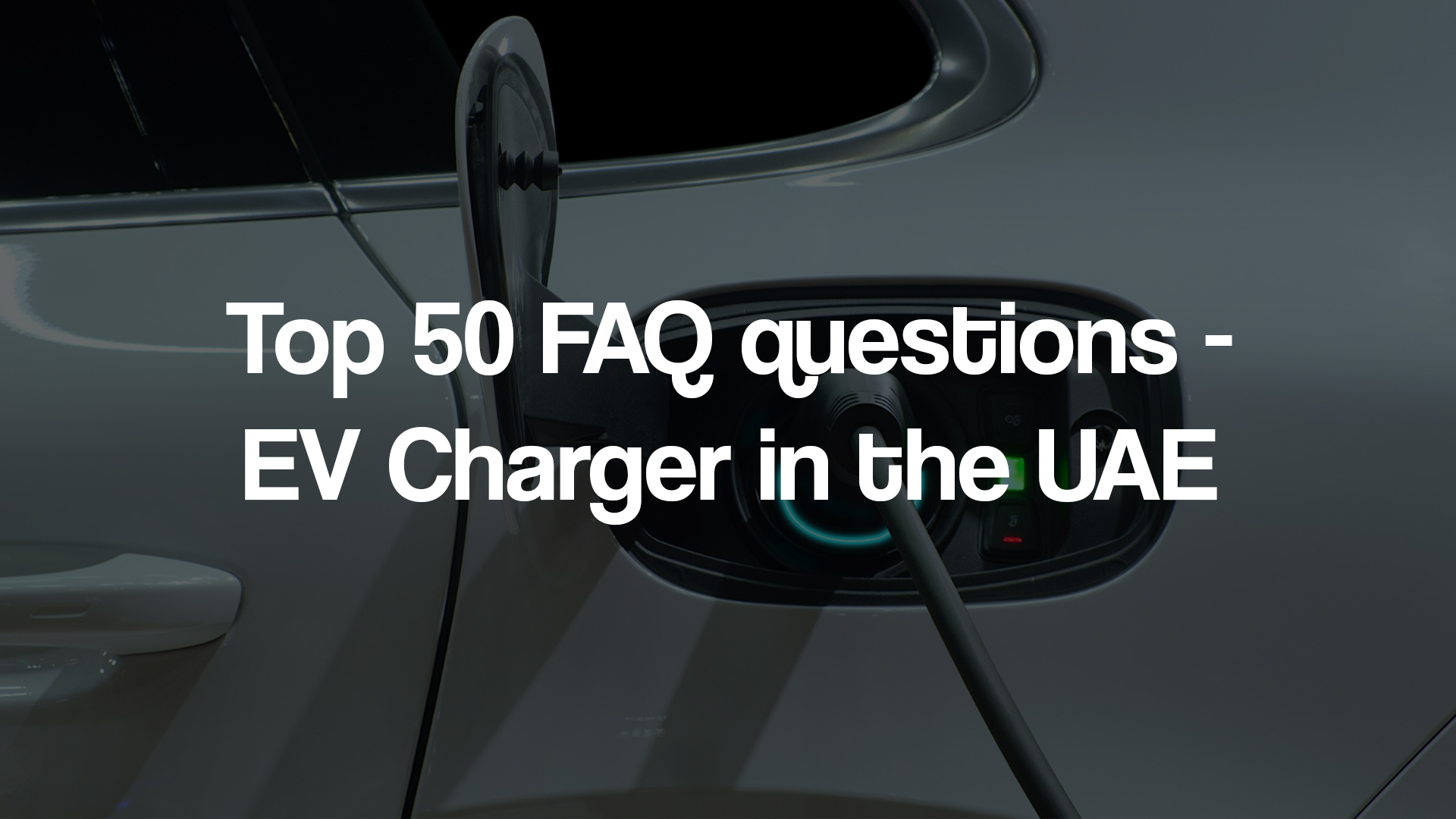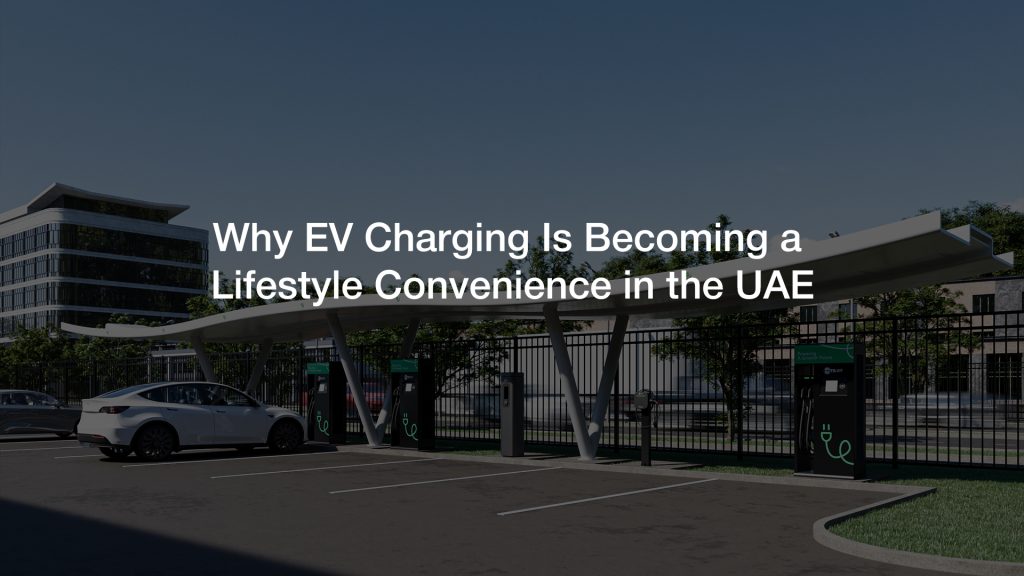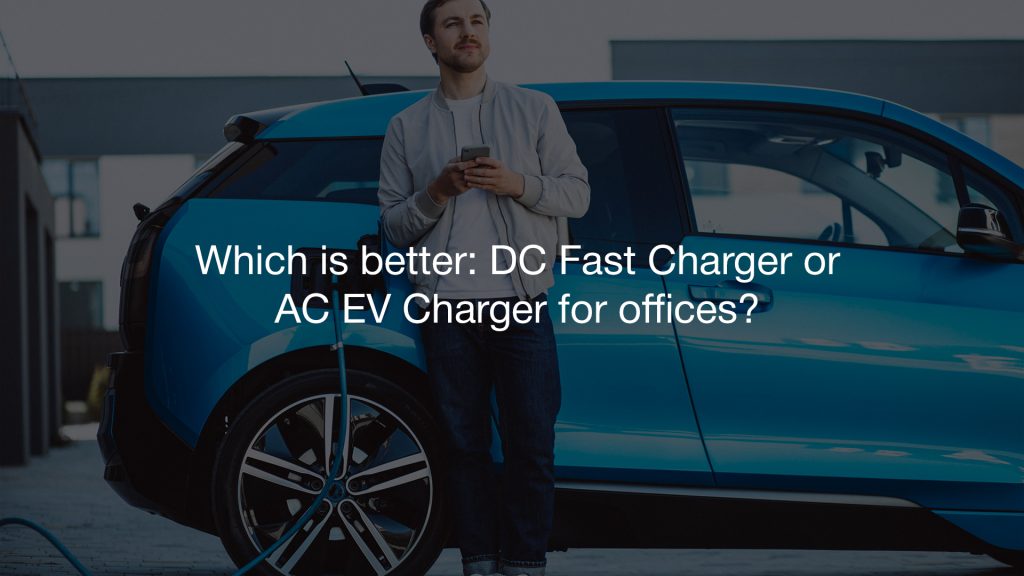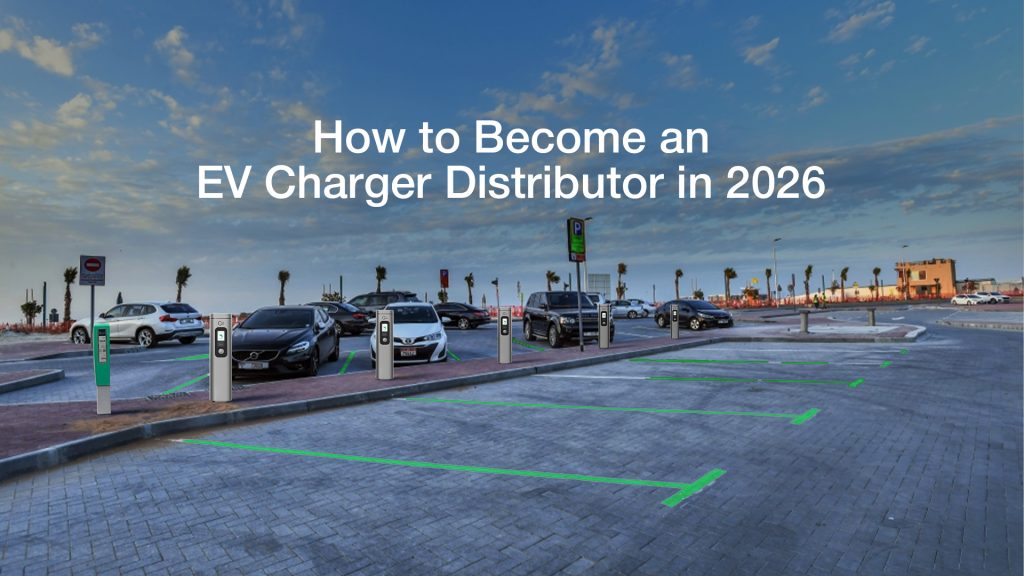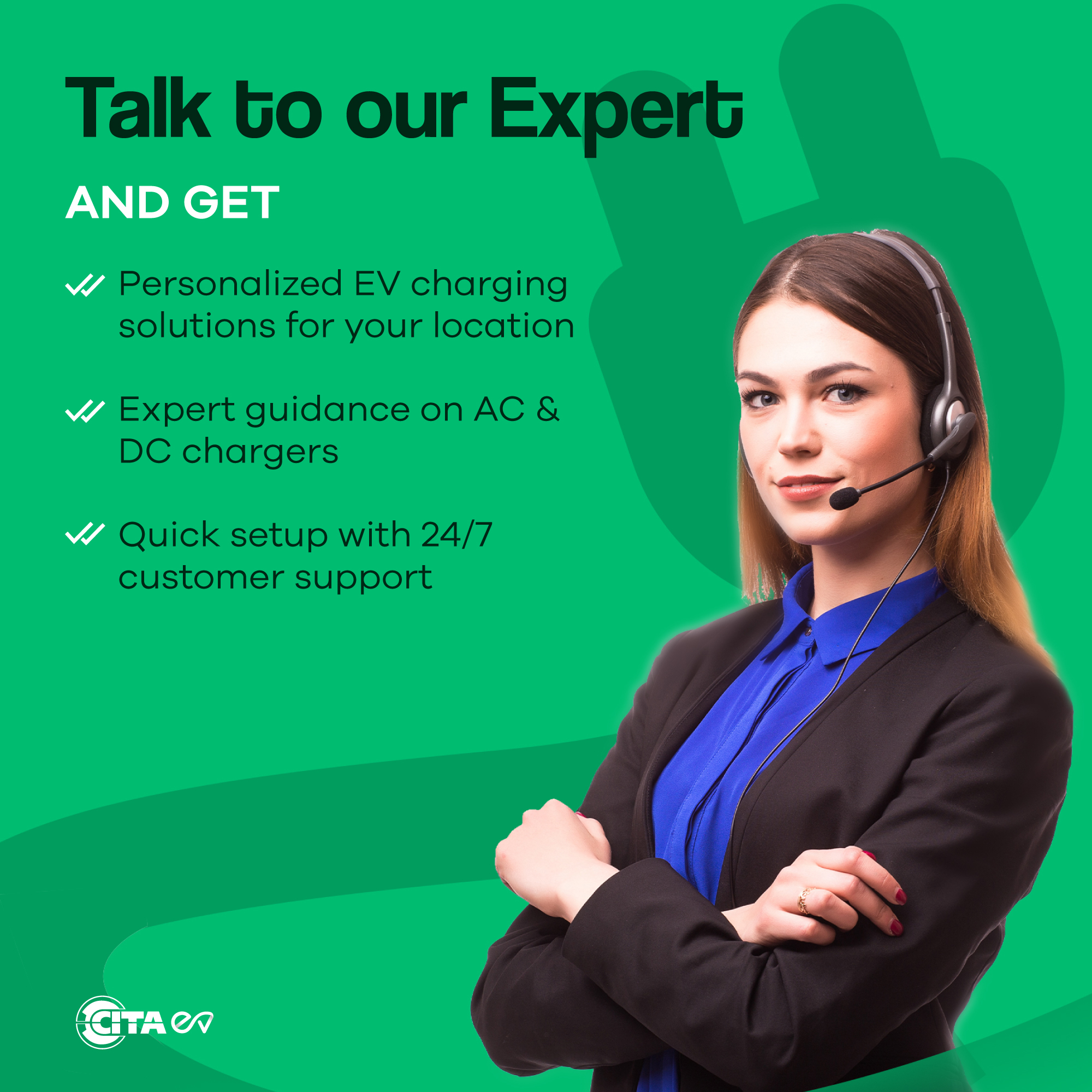Thinking about an EV charger in the UAE but unsure where to begin?
You’re in the right place. As EV adoption surges across the Emirates, the demand for smart, certified EV chargers in the UAE is rising just as fast. Whether you’re considering a home EV charger or planning to install commercial charging points, there’s a lot to figure out – AC vs. DC, connector types, load capacity, approvals, and more.
To make things easier, we’ve pulled together the Top 50 FAQ, the most asked questions about EV chargers in the UAE region. This guide answers what EV owners, facility managers, and businesses are asking every day – in plain, practical terms.
Top 50 FAQ Questions - Everything You Need to Know About an EV Charger in the UAE
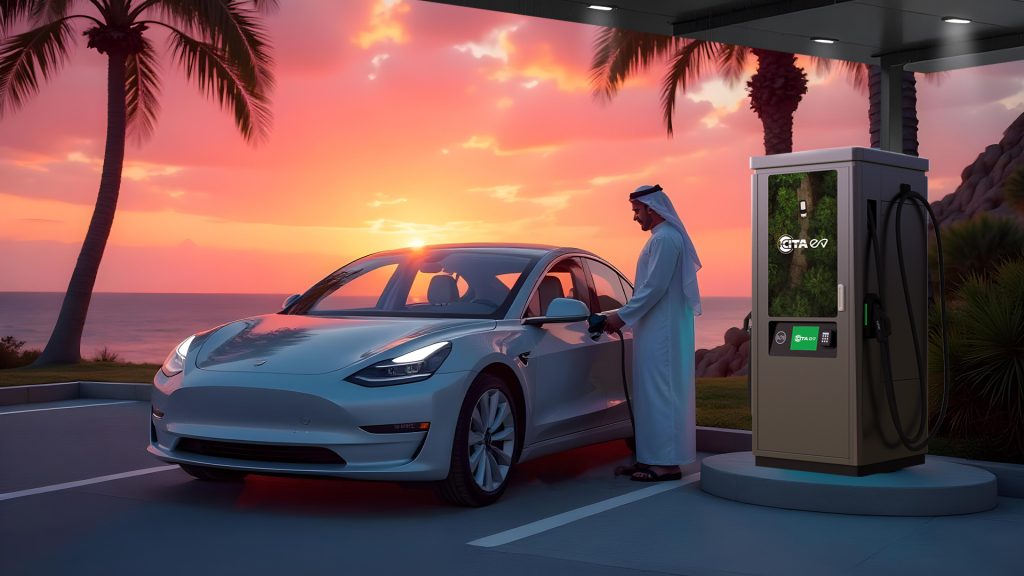
With EV adoption rapidly growing across the UAE, questions about choosing the right EV chargers, installation, safety, certifications and compatibility are more common than ever.
This section breaks down the Top 50 most common FAQ questions about EV chargers – from choosing the right home EV charger in the UAE to understanding certifications, fast charging, and more – so you can make informed decisions confidently.
1) What is an EV charger, and How does it work?
An EV charger is a device that delivers electrical energy to charge the battery of an electric vehicle. It connects to your vehicle and transfers electricity from the power grid into the battery. In the UAE, EV chargers are essential for both residential and commercial charging, ensuring vehicles stay powered for long distances in a region with expanding electric infrastructure.
The EV charger communicates with the vehicle to determine how much power is needed, regulates the flow of electricity, and stops automatically when charging is complete. This ensures safe, efficient, and controlled energy transfer every time you plug in.
2) What types of EV chargers are available in the UAE Region?

There are primarily two types of EV chargers:
AC EV chargers and DC EV chargers.
AC chargers are common for home use and offer slow to moderate charging speeds.
DC chargers, on the other hand, are used in commercial or public setups for fast EV charging, significantly reducing charging time. Both types are essential depending on usage scenarios in the UAE.
3) What’s the difference between AC and DC charging?
AC (Alternating Current) and DC (Direct Current) chargers serve different purposes, and the difference lies in how your EV’s battery receives power.
AC chargers are commonly used for homes, offices, and places where vehicles stay parked for longer. They supply alternating current to the EV, which the onboard charger inside your car then converts into direct current (DC) to charge the battery. This process takes time – usually several hours depending on the charger’s capacity (like 7 kW or 22 kW) and your EV’s battery size.
DC chargers, on the other hand, bypass the car’s onboard EV charger and deliver direct current straight to the battery. This results in significantly faster charging, often going from 20% to 80% in 30–60 minutes depending on the power output (like 60 kW to 350 kW +). That’s why DC chargers are ideal for public charging stations, highways, fleet operations, and commercial hubs across the UAE.
4) What is a smart EV charger and how is it different from a normal EV charger?
A smart EV charger is an intelligent charging device that connects to your phone or web app, allowing remote control, real-time monitoring, and scheduled charging. Unlike standard EV chargers, it can adjust power flow based on grid load or electricity tariffs.
In the UAE, where energy efficiency and tech adoption are key, smart ev chargers help reduce costs, avoid peak loads, and ensure safer, more efficient home and commercial charging.
5) Are EV chargers safe to install at home?
Yes, home EV chargers are safe when installed by licensed professionals using certified EV chargers that meet UAE regulatory standards. Modern EV chargers come with built-in safety features like surge protection, overcurrent control, and automatic shut-off. In cities like Dubai and Abu Dhabi, safety certification from DEWA or ADQCC is often mandatory for residential installations.
6) How long does it take to charge an EV with an AC charger?
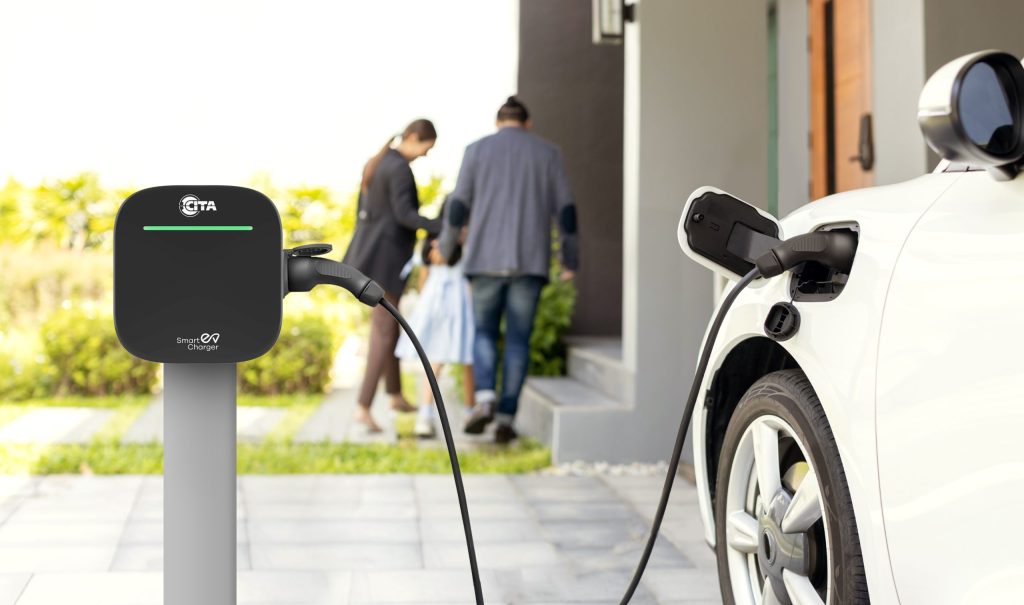
Charging times depend on the ev charger’s power output and the battery size of the EV. A 7kW AC EV charger in the UAE usually takes 8 – 10 hours to fully charge a mid-sized EV. An 11kW or 22kW charger will reduce that time significantly. AC charging is ideal for overnight use at homes or workplaces in the UAE.
7) Which is better, an AC or DC EV charger? and when do you need to use it?
AC and DC EV chargers serve different needs, so which is better depends on how and where you’re charging. AC chargers use alternating current and are ideal for slow, overnight charging at homes or offices. DC chargers deliver direct current straight to the EV battery, enabling rapid charging – typically from 20% to 80% in under 30 minutes.
In the UAE, DC chargers are better suited for public locations like malls, highways, and commercial sites where speed and convenience matter most.
8) Which EV charger do I need for home use?
There are a lot of Home EV charging options available in the UAE market. However, for residential use in the UAE, a 7kW or 11kW AC EV charger is typically ideal.
These EV chargers provide efficient overnight charging and can be installed in villas, apartments, and private garages. Choosing a smart EV charger in the UAE also adds the benefit of scheduling and monitoring your charging through a mobile app, ensuring convenience and cost savings.
9) What is IP rating in EV chargers, and How Important is it?
An IP (Ingress Protection) rating tells you how well an EV charger is protected against dust and water. This is really important in the UAE, where outdoor EV chargers face sand, heat, and sudden rain.
A good rating – like IP65 for AC and IP54/IP55 for DC – means the EV charger is sealed properly and built to last. It helps keep the charger safe, working well, and protected from weather damage.
10) What does IK rating mean, and How Important is it?
The IK rating shows how tough an EV charger in the UAE is when it comes to physical impact – like bumps, knocks, or vandalism. It’s a measure of the ev charger’s outer shell strength. IK10 is the highest rating and means the charger can withstand strong impacts, making it ideal for outdoor or public places.
In the UAE, where chargers are often installed in open spaces like malls, offices, and parking lots, an IK10 rating is important. It protects the charger from accidental damage, harsh weather, and even misuse. Choosing an EV charger in the UAE with a high IK rating ensures better durability, safety, and longer service life – especially in busy or exposed locations.
11) Can I install an EV charger in my apartment?
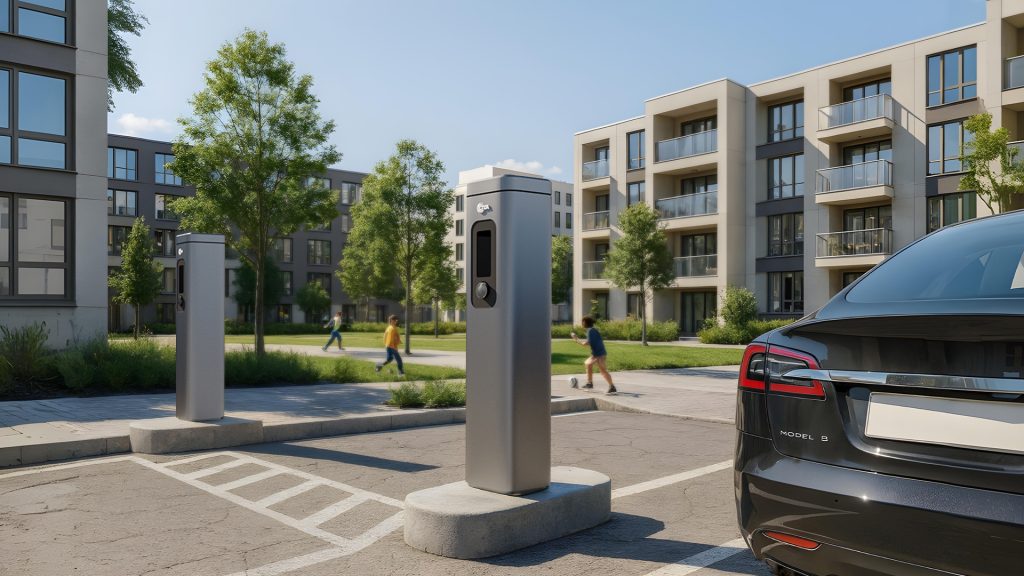
Yes, you can install an EV charger in your apartment building in the UAE, but it’s not as simple as plugging it in. You’ll need to follow a proper process to meet safety and legal requirements.
First, get written approval from your building management or homeowners’ association. They’ll want to know how the installation might affect the shared electrical system and overall infrastructure.
Next, a licensed technician must assess the building’s electrical load capacity. This ensures your EV charger won’t overload the system or disrupt the power supply to other units.
Only certified, DEWA-approved EV chargers should be used – this is mandatory. Using uncertified equipment can lead to fines, denied insurance claims, or safety risks.
Once approved, the ev charger must be installed by qualified professionals who follow UAE regulations and safety codes. If needed, smart load management systems can be added to prevent overuse during peak hours.
In short: yes, it’s possible – but it must be planned, approved, and executed correctly.
12) What is the cost of installing a home EV charger in the UAE?
The cost of installing a home EV charger in the UAE typically ranges between AED 2,000 and AED 6,000. The final price depends on factors like the charger’s brand and features, the complexity of your home’s electrical setup, and where it’s being installed (garage, basement, etc.).
This price usually includes the ev charger unit, wiring, and certified installation. Choosing a DEWA-approved charger and licensed installer is important – not just for safety, but to ensure your system meets local regulations and avoids future issues. While cheaper, uncertified setups might risk fines, damage, or warranty problems. Investing in proper installation means peace of mind, reliability, and long-term savings.
13) Do I need to upgrade my electrical system?
You might need to upgrade your electrical system if it can’t handle the power demand of an EV charger – especially higher-capacity ones like 11 kW or 22 kW. Older homes or apartments with limited load capacity may not be ready for this added demand.
A licensed electrician will need to do a site inspection to check your current setup. Based on that, you might need upgrades like new breakers, thicker wiring, or a load management system to safely support the charger.
Skipping this step can lead to tripped circuits, overheating, or even fire risks. So yes – if your system is outdated or underpowered, an upgrade isn’t just optional; it’s essential.
14) Can I charge multiple EVs at once?
While many companies offer multi-EV charging solutions, CITA stands out with its dual-socket design, allowing two vehicles to charge simultaneously from one unit. It’s perfect for families with more than one EV or for shared parking areas in apartments, offices, or commercial spaces.
Beyond power, it’s also about smart design – Dual EV chargers ( 44 kW Dual AC EV Charger) are sleek, compact, and built to handle the UAE’s climate, with IP-rated enclosures for outdoor use. Plus, they integrate with an EV App and support dynamic load balancing to prevent overloading the electrical system.
So, if you’re planning for future-ready charging at home or a shared facility, A dual EV charger offers both convenience and performance – without taking up extra space.
15) What EV charger options are available in the UAE?
In the UAE, EV chargers come in a wide range of power options to suit different needs.
For AC charging, the most common choices are 7kW, 11kW, and 22kW – ideal for homes, offices, and apartment blocks. These are great for overnight or long-duration charging.
For faster charging, DC chargers start at 60kW and go all the way up to 360 kW+ for ultra-fast performance. These are typically installed at malls, highways, commercial hubs, and fleet depots where quick turnaround is key.
The right charger depends on your EV’s onboard capacity, how often you drive, and the available electrical load at your location.
16) Is there any support from the UAE authorities?
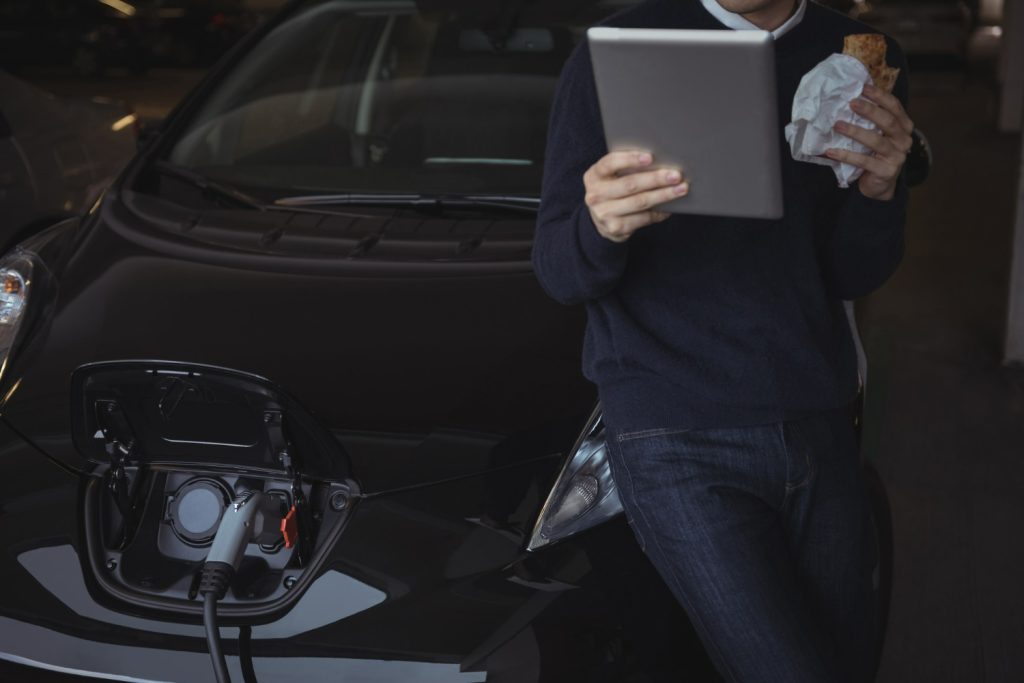
Yes, UAE authorities actively support EV adoption through various initiatives. For example, DEWA’s Green Charger Program in Dubai provides public charging stations across the city and offers free charging for registered EV owners (under certain conditions).
Cities like Dubai, Abu Dhabi, and Sharjah are rapidly expanding their EV infrastructure, including fast-charging networks, dedicated EV parking, and streamlined charger approvals.
In some cases, EV drivers also benefit from perks like reduced registration fees, free Salik tags, and toll exemptions. The government’s push for sustainability and cleaner transport is making it easier – and more affordable – for residents to switch to electric vehicles.
17) Do EV plug types differ by country - and will mine work in the UAE?
Yes, plug types can vary by country. European EVs commonly use Type 2 and CCS2 connectors, which are widely supported across the UAE. However, if you’re driving an American EV (which may use Type 1 or CCS1) or a Chinese EV (often GB/T), you might need an adapter.
Most public EV charging stations in the UAE are built around European standards, so it’s important to check your EV’s charging port and keep an appropriate adapter on hand – especially if your car isn’t region-specific.
This ensures you won’t be caught off-guard at public stations.
18) Can I monitor EV charging remotely?
Yes, you can easily monitor EV charging remotely with most smart EV chargers available in the UAE. These chargers come with mobile apps or web dashboards that let you track real-time charging status, energy consumption, and charging history – all from your phone or computer.
You can also schedule charging during off-peak hours to save on electricity costs, especially with time-of-use tariffs. Many top Brands in UEA offer full remote control, notifications, and smart load management through an EV App, making charging more efficient, flexible, and user-friendly – whether you’re at home, at work, or on the move.
19) Are EV chargers weatherproof?
Yes, most certified EV chargers in the UAE are built to handle the region’s tough outdoor conditions. Top manufacturers, including CITA, offer EV chargers with high IP65 (water and dust resistance) and IK10 (impact protection) ratings.
This means they’re weatherproof – able to function safely during sandstorms, rain, high humidity, and extreme heat. Whether installed in a villa driveway, public parking lot, or commercial space, these chargers are engineered for long-term durability.
While many companies offer outdoor-ready chargers, it’s essential to choose one that’s DEWA or ADQCC approved, so you get reliable performance, safety, and compliance with UAE standards.
20) Can I use any EV charger brand for my EV?
You can’t use just any EV charger with your vehicle – compatibility matters. EVs in the UAE typically use a Type 2 connector for AC charging and CCS or CHAdeMO for DC fast charging. Before installing or using an ev charger in the UAE, always check that it matches your EV’s plug type and charging capacity.
Using a certified, compatible EV charger in the UAE ensures safe, efficient charging without damaging the battery or triggering faults.
21) Do I need a certified EV charger in the UAE?
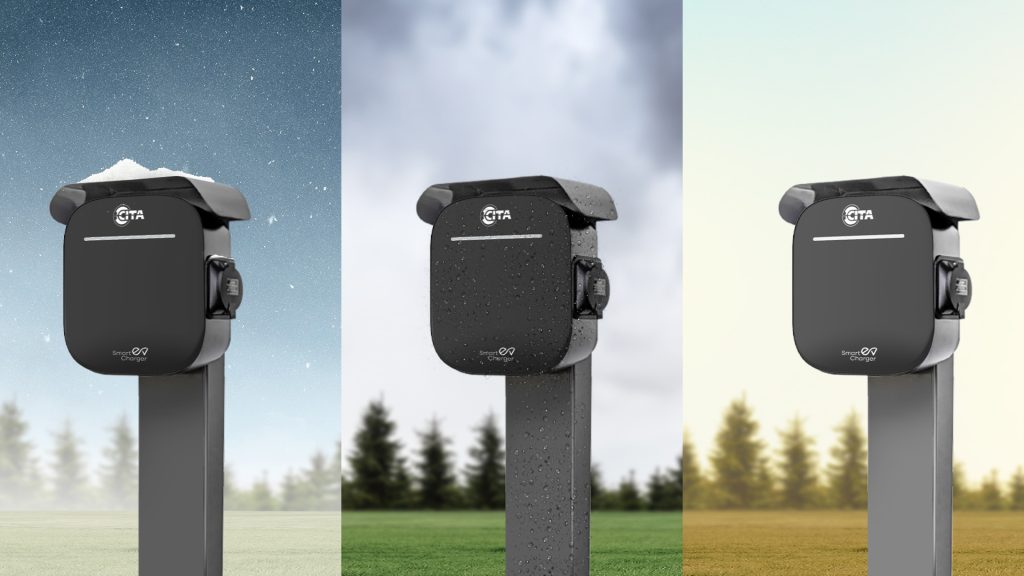
Yes, you do. Using a certified EV charger in the UAE isn’t optional – it’s a regulatory requirement. Chargers approved by authorities like DEWA in Dubai and ADQCC in Abu Dhabi meet strict safety and performance standards. Installing uncertified devices can lead to fines, failed inspections, or warranty issues.
For safety, compliance, and long-term reliability, always choose certified EV chargers from approved providers in the UAE.
22) Are EV chargers universal in the UAE?
Yes, most EV chargers in the UAE are designed to be universal in terms of compatibility. The standard connector used is Type 2 for AC charging, which is widely adopted across Europe and the Middle East.
This means almost all EVs sold in the UAE – whether Tesla, BMW, Nissan, or BYD – are compatible with these chargers. For fast DC charging, CCS is the most common, with some support for CHAdeMO.
So whether you’re charging at home, at a mall, or a public station, you can expect your EV to connect without issues – as long as you’re using a certified, standard-compliant charger.
23) What is the warranty on EV chargers?
Most EV chargers in the UAE come with a standard warranty of 2 to 3 years, depending on the brand and model. Some manufacturers also offer extendable warranty options for added peace of mind.
It’s important to confirm what’s covered – typically, warranties include protection against manufacturing defects, performance issues, and certain hardware failures. Always review the warranty terms with your supplier before buying or installing to ensure you’re fully protected. Choosing a certified EV charger in the UAE with a solid warranty also signals better product quality and long-term reliability.
24) How do I choose the Best EV charger provider in the UAE?
To choose the best EV charger company in the UAE, start by checking if their products are DEWA- or ADQCC-approved, as this ensures safety and regulatory compliance. Look for a provider that offers a wide range of AC and DC chargers, along with certified installation services. It’s also important to consider whether their chargers support smart features like app control and load management.
A good provider should offer at least a 2–3 year warranty, with the option to extend, and have a responsive technical support team for after-sales service. Finally, review the company’s background, customer reviews, and experience in the UAE market.
25) Can I install a solar-compatible EV charger?
Yes, you can install a solar-compatible EV charger in the UAE, and it’s a smart move – especially given the region’s abundant sunlight. Many modern smart EV chargers now support integration with home solar systems, allowing you to charge your vehicle using clean, renewable energy.
These chargers can automatically prioritise solar power when available, reducing your reliance on the grid and cutting electricity costs. They’re ideal for energy-efficient homes, villas with rooftop solar, or anyone looking to reduce their carbon footprint.
Just make sure the charger and solar system are compatible, and that installation is handled by a certified technician familiar with both EV charging and solar setups.
26) How fast are ultra-fast EV chargers?
Ultra-fast DC EV chargers, usually rated between 240 kW and 360 kW, are designed for speed. They can deliver around 200 to 300 km of range in just 15 to 20 minutes, depending on your vehicle’s battery capacity and state of charge.
In the UAE, these high-powered ev chargers are often installed at highway rest stops, commercial hubs, and fleet depots, where quick turnaround is essential. They’re ideal for long-distance drivers or businesses that need fast, efficient charging with minimal downtime.
27) Can I charge my EV at malls and hotels?
Yes, you can easily charge your EV at many malls, hotels, and public venues across the UAE. Cities like Dubai and Abu Dhabi have expanded their EV infrastructure, offering both AC and DC chargers in high-traffic locations.
Popular spots like Dubai Mall, Abu Dhabi Airport, Yas Mall, and major hotels now provide public charging stations, often with dedicated EV parking. Some venues even offer free or discounted charging for guests. It’s a convenient option for topping up your battery while you shop, dine, or stay overnight.
28) Is installation support available in the UAE?
Yes, and it’s not just basic support – most top EV charger providers in the UAE offer complete installation services tailored to your property type. This typically includes a pre-installation site survey, electrical load assessment, proper cabling, breaker setup, and safety inspections.
Whether you’re installing the charger in a villa driveway, apartment basement, or a commercial parking facility, certified technicians ensure everything meets local electrical codes and regulatory standards set by DEWA in Dubai or ADQCC in Abu Dhabi.
They also guide you through permissions, approvals (if needed), and post-installation testing – so your ev runs efficiently, safely, and without any compliance issues. It’s always best to go with a supplier that includes this support, rather than managing installation separately.
29) Can I move my EV charger if I change homes?
Yes, most EV chargers – especially wall-mounted AC chargers used in villas or apartment parking – can be safely relocated when you move. However, this isn’t a simple DIY task. It’s important to have both uninstallation and reinstallation handled by a certified technician, preferably through your original supplier or installer.
Why? Because it ensures the EV charger remains electrically sound, regulation-compliant, and in many cases, still covered under warranty. The technician will also check the electrical setup at your new property and handle any reconfiguration required to get the charger running smoothly again.
30) What maintenance does an EV charger in the UAE need?
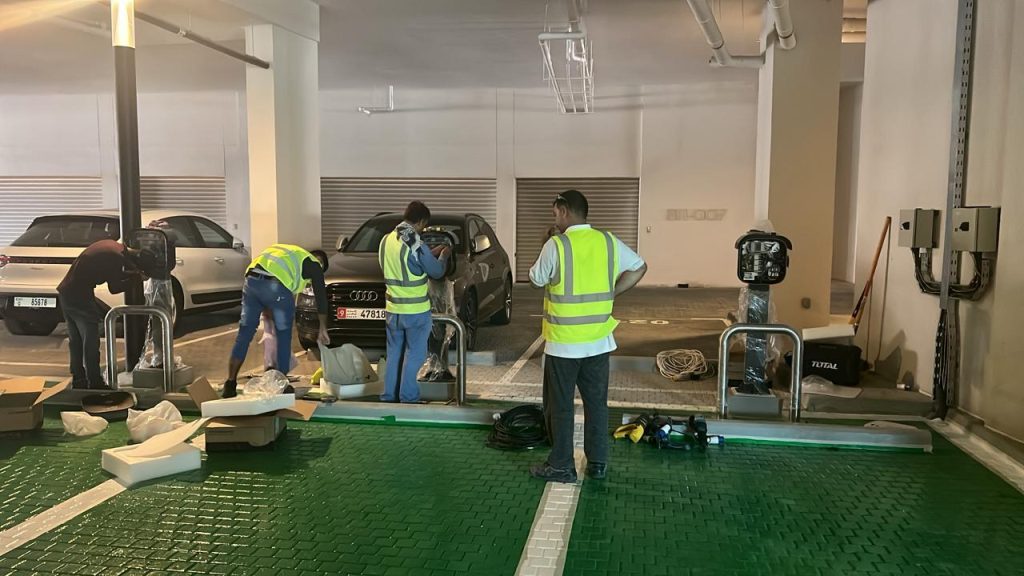
EV chargers – especially smart EV chargers – are designed to be low-maintenance, but a few simple steps can help extend their lifespan and keep them running reliably in UAE conditions.
Here’s what’s typically needed:
- Routine visual inspections to check for dust, debris, or signs of wear, especially on the cable and plug.
- Firmware updates are often automatic (especially with smart chargers), but it’s good to check periodically via the app or portal.
- Occasional cleaning of the outer casing and connector using a dry cloth – particularly important in sandy or coastal environments.
- If you’re using an outdoor charger, it’s smart to verify that the IP rating is holding up – especially after extreme weather.
Annual checks by a certified technician are recommended for commercial setups or high-usage chargers, but for most home users, basic upkeep is more than enough.
31) What EV charger capacity should I buy for my home in the UAE?
The right EV charger for your home depends on your electrical setup. For most villas and apartments in the UAE with a single-phase connection, a 7.4kW AC charger is the practical choice – it’s safe, efficient, and fully charges your EV overnight.
If your villa has a three-phase connection, you can opt for a 22kW AC charger, which delivers much faster charging.
But here’s the thing – before you buy anything, get a professional to assess your home’s load capacity. It’s the only way to ensure safe installation and long-term performance.
32) Why doesn’t my home EV charger cable reach my car - can I get a longer one?
If your home ev charger in the UAE doesn’t comfortably reach your car, you’re not alone. Most EV chargers come with standard cables (5 to 7 metres), which may fall short depending on how your driveway or garage is laid out. Yes, longer cables are available – but there’s a catch.
Using a longer cable isn’t just about convenience. It must meet local safety standards, especially in places like the UAE or UK where regulations may limit cable length to prevent voltage drop, overheating, or tripping hazards. Not all EV chargers support longer cables either, so you’ll need to check with your installer or manufacturer.
The smart move? Plan the EV charger placement before installation. If you already have one installed, ask if a longer, manufacturer-approved cable can be fitted without voiding your warranty or affecting charging speed. Avoid third-party extensions unless they’re certified – cutting corners here can create real safety issues.
33) Can I charge overnight safely?
Yes, charging your EV overnight is not only safe, it’s actually one of the smartest ways to charge – especially in UAE homes. Most smart EV chargers are designed with advanced safety features like overcurrent protection, thermal cut-off, and automatic shut-off when the battery is full. These safeguards allow your vehicle to charge quietly and securely while you sleep.
What makes it even better is the ability to schedule charging during off-peak hours – usually late at night when electricity demand is low and rates are cheaper. That means you wake up to a fully charged car and lower energy bills.
If you’re using a charger connected to a mobile app, you can control, monitor, and even delay charging remotely.
So yes, with the right certified EV charger in the UAE, overnight charging is not only safe – it’s also efficient, cost-effective, and tailored for the UAE’s residential lifestyle.
34) What’s the difference between single-phase and three-phase EV chargers?
The main difference lies in the power output and the type of electrical connection your property has.
Single-phase EV chargers, commonly found in apartments or smaller homes, usually offer up to 7 kW of charging power. They’re perfect for daily charging needs if you drive moderate distances and have overnight charging time.
Three-phase EV chargers, on the other hand, provide 11 kW or even 22 kW, but they require a three-phase electrical supply – more common in villas, townhouses, or commercial buildings in the UAE. These chargers are much faster and suitable for households with high energy demand or multiple EVs.
Bottom line: if you live in a villa with a three-phase connection, a 22 kW charger can cut down charging time significantly. But if you’re in an apartment, a 7 kW single-phase charger is usually the most practical and approved option.
35) Are commercial properties required to have EV chargers?
As of now, there’s no legal requirement that forces commercial properties in the UAE to install EV chargers. However, the trend is shifting quickly. Many new commercial developments – shopping malls, office buildings, hotels, and mixed-use complexes – are voluntarily adding EV charging infrastructure.
Why? It’s partly about future-proofing. As electric vehicle adoption rises and regulations evolve, having EV chargers in place can increase property value, attract eco-conscious tenants, and align with the UAE’s Vision 2030 sustainability goals.
In short, while it’s not compulsory yet, it’s becoming a smart business move.
36) Can I integrate my EV charger with a CPMS?
Yes, you can – and it’s a smart move if you’re managing more than one charger or want greater control over your EV charging setup. Many smart EV chargers in the UAE are designed to integrate seamlessly with Charge Point Management Systems (CPMS).
With CPMS, you can monitor charger performance in real time, manage multiple users, set up automated billing, and even enable load balancing to avoid power overloads during peak usage. This is especially useful for commercial properties, residential communities, and fleet operators, but even some tech-savvy homeowners are opting for it.
Bottom line: If you want smarter, scalable, and more efficient EV charging – CPMS integration is the way to go.
37) Are there mobile apps for EV charging?
Absolutely. Most EV charger providers in the UAE offer dedicated mobile apps to make charging more convenient and user-friendly. These apps let you start or stop charging, schedule sessions during off-peak hours, track your energy consumption, and receive notifications when your EV is fully charged.
For public charging, many apps also support location tracking, real-time availability, and secure payments – so you can find a nearby charger, plug in, and pay – all from your phone.
In short, the app becomes your remote control for smart, efficient EV charging.
38) Why are some areas still missing public EV chargers in the UAE?
Not every area in the UAE has public EV chargers yet because rollout often prioritizes high-traffic or high-demand zones first – like malls, highways, or city centres. But there’s momentum. DEWA, local municipalities, and private EV charger in the UAE’s companies are actively expanding the network to cover suburban, rural, and newly developed areas.
The goal? Make EV charging convenient no matter where you are – while also reducing peak-hour wait times in busy spots.
Large-scale infrastructure plans tied to the UAE’s sustainability vision are already underway, so expect to see better coverage soon.
39) Will UAE’s shift to paid public EV charging in 2025 affect my charger or costs?
Yes, the transition from free to paid public EV charging will impact how you use and pay at public EV chargers across the UAE. Starting in 2025, most government and private EV charging networks will charge per kilowatt-hour or per minute, depending on the charger type (AC or DC). You’ll need to pay using RFID cards, mobile apps, or linked payment methods.
Your home EV charger in the UAE won’t be affected – residential EV charging remains under your local utility billing and is not part of the public tariff system. However, expect more structured pricing, improved availability, and possibly new incentives based on time-of-use or peak hours for public charging.
40) Can I charge my EV during rain?
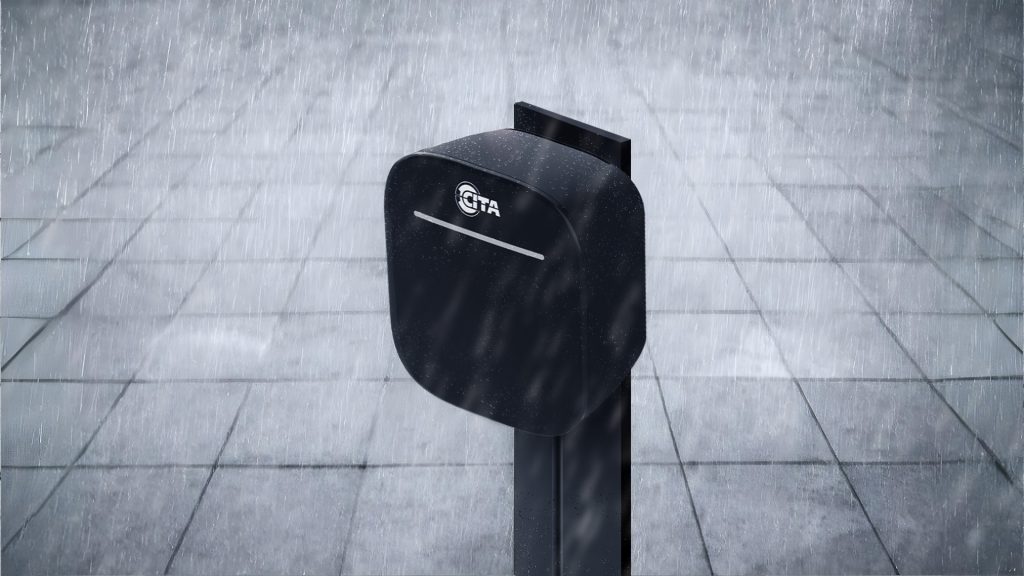
Yes, you can. Most certified EV chargers in the UAE are built for outdoor use and come with IP65 or higher weatherproof ratings, which means they’re sealed against dust, water, and harsh climate conditions – including rain, humidity, and even sandstorms.
That said, it’s still smart to follow basic safety practices: avoid using damaged cables, make sure connectors are dry before plugging in, and never force a connection. But in general, a properly installed charger is safe to use year-round, rain or shine.
41) How do I find the nearest EV charging station?
The easiest way is through EV charging mobile apps – either from your charger provider or popular platforms like PlugShare, ChargeMap, or DEWA’s app in Dubai. These apps let you view nearby charging stations, check real-time availability, see charging speeds, pricing, and even get directions.
Many EV charger providers in the UAE also offer web-based maps or integrate with Google Maps, so you can plan routes or locate stations while on the move.
42) What happens if the EV charger stops mid-charge?
If a smart EV charger in the UAE stops unexpectedly during ev charging, it typically sends an alert to your mobile app or control system and safely pauses the charging process. This automatic pause protects both your EV’s battery and the charger from potential damage.
In the UAE, certified ev chargers follow strict safety protocols to handle such interruptions smoothly. You can usually resume charging once the issue is resolved, and support teams can assist if needed.
43) Why does my EV charger often stop or slow down charging at around 80%?
Many electric vehicles intentionally slow down or pause charging once they reach around 80% battery capacity.
This is a protective measure to reduce heat buildup and prevent battery degradation, helping extend overall battery life.
Some public EV chargers also have software settings or energy management protocols that limit charging speed or pause charging near this level to optimize grid load and improve safety.
44) Does home charging qualify for special tariffs or time-of-use rates in 2025?
As of 2025, home EV charging in the UAE is billed under standard residential electricity rates – there are no special tariffs or time-of-use pricing specifically for EV owners yet.
However, using a smart EV charger in the UAE to schedule charging during off-peak hours can help reduce electricity costs. Public charging stations, on the other hand, have regulated tariffs that vary by charging speed.
45) What are the risks of using low-cost or uncertified EV chargers in UAE homes?
Using low-cost or uncertified EV chargers in UAE homes poses serious risks.
These EV chargers often lack essential safety features like overload protection and proper insulation, increasing the chances of electrical faults or even fires. They may also damage your EV’s battery or reduce its lifespan.
Additionally, uncertified EV chargers in the UAE don’t comply with DEWA or ADQCC regulations, which can void your warranty and lead to legal or insurance complications. For safety and reliability, always opt for certified, approved chargers.
46) Are fast EV chargers safe for battery health?
Fast DC chargers are built with safety and battery care in mind. They deliver high power quickly but include systems to manage heat and control charging speed to minimize stress on the battery.
While frequent use of ultra-fast charging can slightly impact battery lifespan over many years, modern EVs have smart battery management systems that protect against damage. For everyday charging, using a regular AC charger and reserving fast charging for longer trips is a balanced approach.
47) Can I use a regular socket for EV charging?
Technically, you can charge your EV using a regular household socket, but it’s not recommended. EV Charging this way is very slow and inefficient and can pose safety risks like overheating or electrical faults.
In the UAE, it’s far better to use a certified EV charger designed for safe, faster ev charging with built-in protections. These EV chargers ensure efficient power delivery and protect your home’s electrical system and comply with local regulations – giving you peace of mind and a quicker charge.
48) How do I become an EV charger distributor in the UAE?
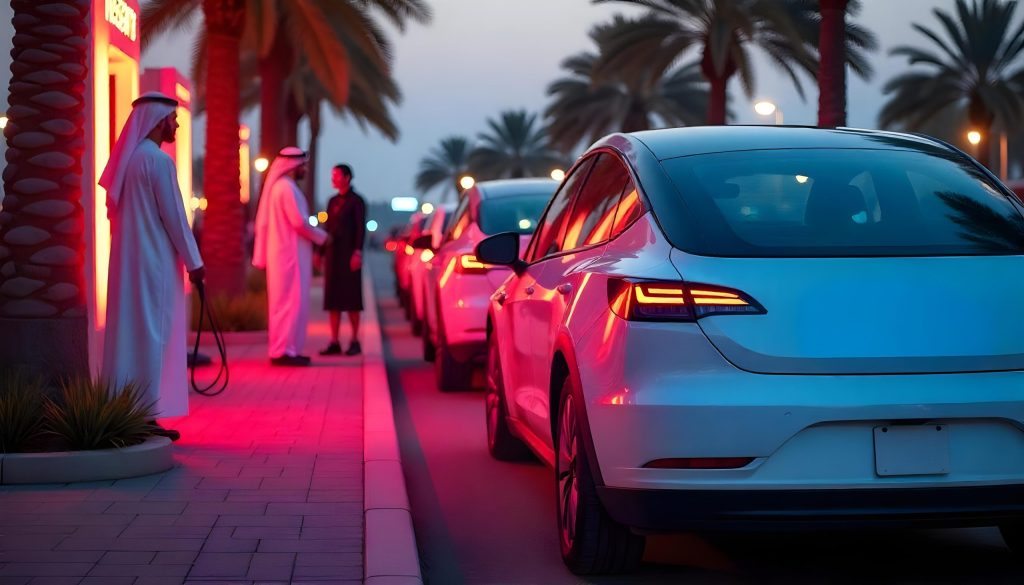
To become a distributor, start by partnering with a reputable EV charger manufacturer – brands like CITA EV Charger are a good example, offering solid products, technical support, and training. Next, you’ll need to register your business with relevant authorities like DEWA or ADQCC to ensure compliance with UAE regulations.
Meeting local safety and quality standards is essential, so invest in proper certifications and understand the market needs. Building relationships with installers, developers, and government bodies will also help you grow your distribution network effectively.
49) What makes a charger “approved” in the UAE?
An approved EV charger in the UAE meets strict standards set by DEWA and ADQCC covering design, safety, electrical efficiency, and environmental resistance. These certifications ensure the charger is reliable, safe to use, and compatible with the local power grid.
Approval isn’t just a label – it’s mandatory for all public and residential installations, protecting users and helping maintain the integrity of the UAE’s growing EV infrastructure. Without these certifications, chargers may face legal issues or fail to qualify for government incentives.
50) Where can I buy a reliable EV charger in the UAE?
Purchase from a certified EV charger supplier in UAE who offers DEWA- or ADQCC-approved products, backed by a solid warranty and professional installation support. Choose a supplier experienced in meeting your specific needs – whether for home, apartment complexes, or commercial properties.
Trusted brands like CITA EV Charger provide high-quality, safe, and durable solutions with excellent after-sales service. Always check product certifications and customer feedback to ensure you’re investing in a reliable EV charging system for the long term.
CITA EV Charger: The Trusted Partner in UAE EV Charging
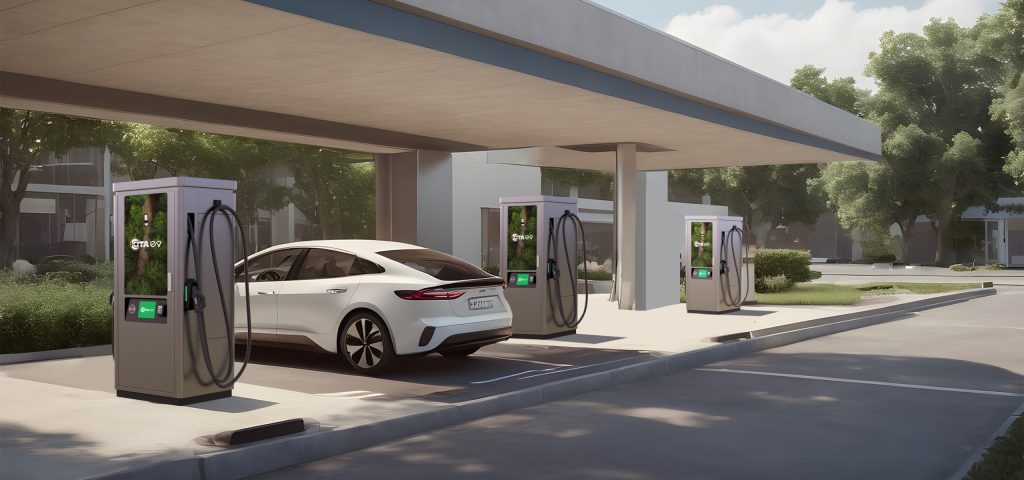
If you’re looking for a future-ready, tested, and reliable EV charging solution in the UAE, CITA EV Charger delivers on every front.
As a leading EV charger manufacturer in the UAE, CITA offers a complete range of certified AC EV chargers and DC EV chargers, built to meet UAE authority standards like DEWA and ADQCC.
With 3-year warranty (extendable) on AC units and 2 years on DC, along with continuous support, global presence, and software tools like the CITA EV App and CPMS, CITA empowers homes, businesses, and public spaces to charge smartly and safely.
Ready to bring the future of charging to your space?
Explore our product range today. Book a Free consultation with our team.



